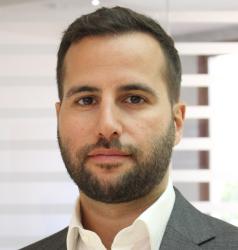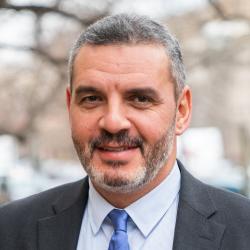2024
Content from the Brookings Doha Center is now archived. In September 2021, after 14 years of impactful partnership, Brookings and the Brookings Doha Center announced that they were ending their affiliation. The Brookings Doha Center is now the Middle East Council on Global Affairs, a separate public policy institution based in Qatar.
The Brookings Doha Center (BDC) hosted a webinar discussion on June 29, 2020 on the implications of Israeli annexation and the future of Palestine. Panelists focused on what the response has been from Israel, the Palestinian Authority (PA), the United States, and the European Union (EU). They also considered the consequences for everyone involved, especially the Palestinian people. The panel consisted of a group of distinguished scholars and experts, including: Dahlia Scheindlin, fellow at the Century Foundation; Hugh Lovatt, policy fellow at the European Council on Foreign Relations; and Khalid Elgindy, senior fellow at the Middle East Institute. Omar H. Rahman, visiting fellow at the BDC, moderated the event.
Dahlia Scheindlin began the discussion and spoke about the history of annexation. Firstly, she differentiated between de jure (legal) and de facto annexation. Israel had started discussing the former within formal political circles in 2012. However, de facto annexation has been taking place since the Six-Day War, Scheindlin argued, in the form of the settlement movement. Due to this fact, many have believed that formal annexation is an inevitability that will come to fruition on July 1, according to the timeline of Prime Minister Benjamin Netanyahu. Yet Scheindlin refuted this and said that the declaration of de jure annexation was surprising given that Netanyahu has always preferred policies offering plausible deniability. Indeed, the leader has been careful to walk a thin line between carrying out actions that provoke verbal condemnation without encouraging punitive measures by the international community. Ultimately, the fellow contended that the declaration changes the dynamic for all sides. It makes clear that Israel wants to avoid the establishment of a Palestinian state. Finally, Scheindlin spoke about Israeli public opinion and noted that a recent survey showed 69 percent of Israelis as being against unilateral annexation. Public opinion is weak on this issue, and the fellow has yet to come across a survey demonstrating an absolute majority being for annexation.
Khaled Elgindy continued the discussion and described the Palestinian response. Firstly, he noted that Palestinian leadership was ill-prepared to confront the Trump peace plan. This despite the fact that President Donald Trump made clear his intention to reorient U.S. policy in Israel before entering office. In response to the plan, Palestinian leadership has done the absolute minimum by ending most Israeli security coordination. In this way, President Mahmoud Abbas is trying to show Israel the challenges it would face if the Palestinian Authority (PA) dissolves. However, this is a risky tactic that could threaten the already shaky existence of the Palestinian body. Indeed, in addition to looming annexation, the PA faces the difficulty of a severe financial crisis as it no longer receives Israeli tax transfers or funds from the Trump administration. Ultimately, Elgindy contended that to ensure the survival of the Palestinian cause, there must be a change of leadership, which at this point is both “in-cohesive and incoherent.” Moreover, the fellow spoke about the United States’ role. He noted that formal annexation would not have become a political reality without Trump. And while there has been some opposition by the Democratic party to annexation, Washington will not push for consequences even if former Vice President Joe Biden is elected.
Hugh Lovatt concluded the discussion by touching on the European response. He noted that surprisingly 26 out of 27 EU members opposed annexation. And while most states have demonstrated opposition, they are unable to agree on the correct response. Lovatt explained that the EU is an actor, which favors the status quo vis-à-vis the Israeli-Palestinian case. The body wants to uphold the Oslo paradigm and will continue to recognize borders according to the 1967 line even if annexation occurs. Moreover, the fellow contended that while there is pressure on the EU to stop funding the PA and its support of the two-state solution, it is up to Palestinians to decide whether two-states is a possibility. Finally, Lovatt spoke on the implications of annexation for the Middle East more broadly and the responses of Jordan, Egypt, and the Gulf. He noted that Jordan would be the Arab state that is most impacted by the peace plan and so has been the most vocal. The country is concerned about annexation for several reasons: (1) Jordan hosts a large Palestinian community; (2) it fears annexation will cause an influx of refugees; and (3) a two-state solution is a pillar of Jordanian policy. However, Lovatt stated that Jordan’s concerns were not taken into account because the Trump administration did not engage widely with the country. Rather, Trump, in his contact with the Middle East, has looked to the Gulf, especially Saudi Arabia and the United Arab Emirates, to act as “interlocutors.”
In the subsequent question and answer session, panelists focused on the potential of a two-state solution, the border with Jordan, and Israel’s response to the COVID-19 pandemic. Elgindy contended that the Oslo paradigm collapsed before Abbas’ declaration and the election of Trump. He added that all trends are moving away from a two-state solution, even on the Palestinian side. Scheindlin was posed a question about how Israel would react if Jordan closed its border in protest of annexation. The fellow stated that this is an extreme scenario that will likely not happen anytime soon. Scheindlin then spoke on the implications of the coronavirus and said that it has caused an unprecedented level of cooperation between Israel and Hamas to contain the spread. Lovatt agreed with Elgindy in saying that the Oslo paradigm has been dead for quite some time, however, it has been upheld by the EU and other governments for the sake of convenience. Finally, he stated that it is uncertain whether de jure annexation will take place on July 1. If it doesn’t, there is the risk that Israel will return to de facto annexation.
Agenda
-
June 29
-
Moderator
-
Speakers
 Dahlia Scheindlin Scholar - The Century Foundation
Dahlia Scheindlin Scholar - The Century Foundation Hugh Lovatt Policy Fellow - European Council on Foreign Relations
Hugh Lovatt Policy Fellow - European Council on Foreign Relations
-



